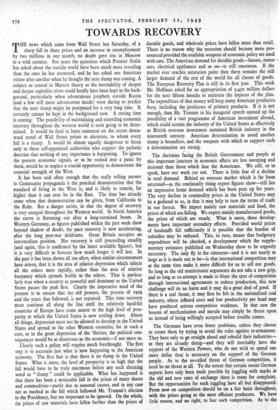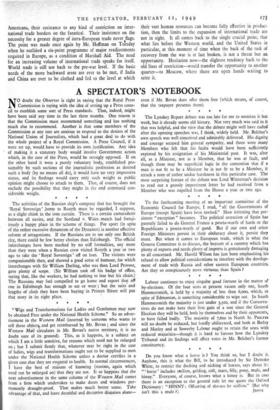TOWARDS RECOVERY
M HE news which came from Wall Street last Saturday, of a sharp fall in share prices and an increase in unemployment by two millions in one month, no doubt gave rise in Moscow to a wild surmise. For years the questions which Premier Stalin has asked about the outside world have been much more revealing than the ones he has answered, and he has asked one American visitor after another when he thought the next slump was coming. A subject so central in Marxist theory as the inevitability of deeper and deeper capitalist crises could hardly have been kept in the back- ground, particularly when adventurous prophets outside Russia (and a few still more adventurous inside) were daring to predict that the next slump might be postponed for a very long time. It certainly cannot be kept in the background now. A testing time is coming. The possibility of maintaining and extending economic recovery throughout the western world is soon going to be deter- mined. It would be fatal to leave comment on the recent down- ward trend of Wall Street prices to alarmists, to whom every fall is a slump. It would be almost equally dangerous to listen only to those self-appointed authorities who support the pathetic doctrine that nothing of any importance is happening. To ignore the present economic signals, or to be rushed into a panic by them, would be to neglect a crucial opportunity to demonstrate the essential strength of the West. It has been said often enough that the really telling answer to Communist propaganda is the practical demonstration that the standard of living in the West is, and is likely to remain, far higher than it can ever be in the East. The time has already come when that demonstration can be given, from California to the Ruhr. But a danger exists, in that the degree of recovery is very unequal throughout the Western world. In North America the curve is flattening out after a long-sustained boom. In Western Germany, as figures published within the past week show beyond shadow of doubt, the pace recovery is now accelerating, after the long post-war doldrums. Great Britain occupies an intermediate position. Her recovery is still proceeding steadily (and again, this is confirmed by the latest available figures), but it is very difficult to forecast how much longer it will last. In the past it has been shown all too often, when similar circumstances have arisen, that it is the area of relative depression which infects all the others most rapidly, rather than the area of relative buoyancy which spreads health to the others. That is particu- larly true when a country as powerful and dominant as the United States passes the peak first. Clearly the imperative need of the present is to ensure that the old process, the process of 1929 and the years that followed, is not repeated. This time recovery must continue all along the line until the relatively hard-hit countries of Europe have come nearer to the high level of pros- perity at which the United States is now settling down. Above all things, depression must not be allowed to develop in the United States and spread to the other Western countries, for in such a case, as in the great depression of the 'thirties, the political con- sequences would be as disastrous as the economic—if not more so.
Clearly such a policy will require much forethought. The first step is to ascertain just what is now happening to the American economy. The first fact is that there is no slump in the United States. What is more, the level of prosperity is so high that the fall would have to be truly enormous before any such alarming word as " slump " could be applicable. What has happened is that there has been a noticeable fall in the prices of many shares and commodities—partly due to seasonal causes, and in any case not as marked as the fall which followed Mr. Truman's election to the Presidency, but too important to be ignored. On the whole, the prices of raw materials have fallen further than the prices of durable goods, and wholesale prices have fallen more than retail. There is no reason why the recession should become more pro- nounced provided the available weapons of economic policy are used with care. The American demand for durable goods—houses, motor cars, electrical appliances and so on—is still enormous. If the market ever reaches_ saturation point then there remains the still larger demand of the rest of the world for all classes of goods. The European Recovery Plan is still in its first year. This week Mr. Hoffman asked for an appropriation of 5,430 million dollars for the next fifteen months to maintain the impetus of the plan. The expenditure of that money will keep many American producers busy, including the producers of primary products. If it is not enough, then Mr. Truman in his inaugural speech opened up the possibility of a vast programme of American investment abroad, which could sustain the industry of the United States as effectively as British overseas investment sustained British industry in the nineteenth century. American determination to avoid another slump is boundless, and the weapons with which to support such a determination are strong.
The decisions facing the British Government and people at this important juncture in economic affairs are less sweeping and insistent than those which face the Americans. We still, so to speak, have our work cut out. There is little fear of a decline in total demand. Behind an overseas market which is far from saturated—as the continually rising export figures show—still lies an impressive home demand which has been pent up for years. The very decline in commodity prices in the United States may be a godsend to us, in that it may help to turn the terms of trade in our favour. We import mainly raw materials and food, the prices of which are falling. We export mainly manufactured goods, the prices of which are steady. What is more, these develop- ments have important secondary effects. Provided world prices of foodstuffs fall sufficiently it is possible that the burden of subsidies may be reduced. This, in turn, means that budgetary expenditure will be checked, a development which the supple- mentary estimates published on Wednesday show to be urgently necessary. The only fly in the ointment—and it is not nearly as large as it is made out to be—is that international competition may at the same time make it more difficult for us to sell our goods. So long as the old restrictionist arguments do not take a new grip, and so long as no attempt is made to blunt the spur of competition through international agreements to reduce production, this new challenge will do no harm and it may do a great deal of good. If there is a real threat, it may first be felt in the nationalised coal industry, where inflated costs and low productivity per head may have produced serious competitive weakness. In that case the lessons of mechanisation and morale may simply be thrust upon us instead of being willingly accepted before trouble comes.
The Germans have even fewer problems, unless they choose . to create them by trying to avoid the rules against re-armament. They have only to go straight ahead and rebuild their industries— as they are already doing—and they will inevitably have the support of the Western Powers, who do not wish to spend one more dollar than is necessary on the support of the German people. As to the so-called threat of German competition, it need be no threat at all. To the extent that certain recent German exports have only been made possible by juggling with marks at the old and new rates of exchange there is room for complaint. But the opportunities for such juggling have all but disappeared.. From now on competition should be on a fair basis throughout, with the prizes -going to the most efficient producers. We have little reason, and no right, to fear such competition. As to the Americans, their resistance to any kind of restriction on inter- national trade borders on the fanatical. Their insistence on the necessity for a greater degree of intra-European trade never )flags. The point was made once again by Mr. Hoffman on Tuesday when he outlined a six-point programme of major readjustments required in Europe, as a condition of Marshall Aid. The need for an increasing volume of international trade speaks for itself. World trade is still not back to the pre-war level. If the basic needs of the more backward areas are ever to be met, if India and China are ever to be clothed and fed to the level at which their vast human resources can become fully effective in produc- tion, then the limits to the expansion of international trade are not in sight. It all comes back to the single crucial point, that what lies before the Western world, and the United States in particular, at this moment of time when the back of the task of recovery from the war is at last broken, is not a threat but an opportunity. Hesitation now—the slightest tendency back to the old lines of restriction—would transfer the opportunity to another quarter—to Moscow, where there are open hands waiting to seize it.







































 Previous page
Previous page